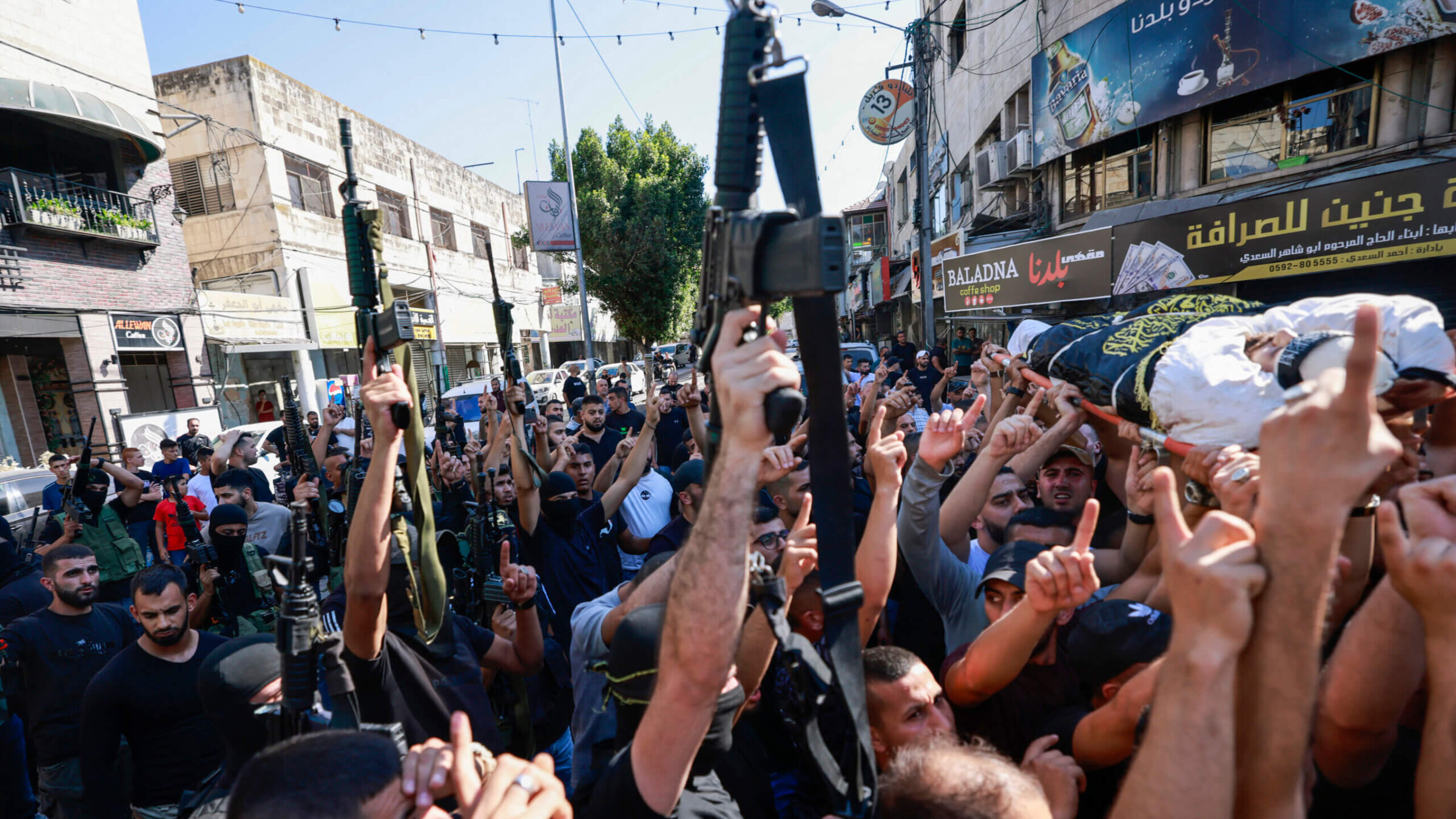West Bank, the next feared flashpoint, was there all along
With a large Israeli operation in Jenin and Tulkarm, the West Bank is seething

Relatives and gunmen attend the funeral of five Palestinians killed in an Israeli strike in Jenin in the occupied West Bank, Aug. 6. Photo by Jaafar Ashtiyeh/AFP via Getty Images
No one can know for sure what Hamas was thinking when it sparked the current war on Oct. 7. But it’s a good bet that it hoped to not only draw Israel into quagmire in Gaza, but also spark a new intifada in the West Bank, igniting chaos and bloodshed in Israel between Arabs and Jews and wars on other fronts.
Its desired quagmire has certainly materialized, thanks to the strategic deficiencies of the deplorable Israeli government. So has a front in the north, where for almost 11 months Hezbollah has been firing at Israel, causing the evacuation of almost 100,000 people. But the Israeli military has succeeded so far in keeping something of a lid on the West Bank. But the pot is rapidly coming to a boil.
The latest reflection of that came Wednesday, in a large-scale counterterrorism operation involving hundreds of Israeli soldiers in which at least nine Palestinian gunmen were killed by the Israel Defense Forces in the towns of Tulkarm and Jenin. The raids involved the Kfir Brigade, Duvdevan Commando Unit, and combat engineers, and the military suggested it is expected to last several days.
Although a full uprising has so far been stayed, the West Bank has been seething. Since Oct. 7, over 650 Palestinians have been killed in airstrikes and raids (according to the United Nations Office for the Coordination of Humanitarian Affairs), and almost 5,000 have been arrested, almost half of them known Hamas affiliates. Settlers have also rampaged unpunished in the West Bank. The Shin Bet chief, Ronen Bar, singled out the settler actions in particular — which resulted in a Palestinian death in the Jit village last week — as causing “indescribable” harm.
Palestinians in the West Bank are also on the brink of economic ruin. The more than 100,000 Palestinians with permits to work in Israel have been unable to do so since the Hamas attacks, when Israel indefinitely froze the majority of permits. Under extremist Finance Minister Bezalel Smotrich, Israel has also withheld millions in funding for the beleaguered Palestinian Authority, creating even more desperation within the occupied territory.
With ceasefire talks seeming to stumble, and with tensions with Iran on the rise after the July assassination (attributed to Israel) of Hamas leader Ismail Haniyeh in Tehran, there is increasing apprehension that the lid may come off. In a series of reports and briefings in recent days, Israel Defense Forces and Shin Bet officials have been warning that an explosion may be coming.
The IDF operation this week appears to come in response to a recent attempted suicide bombing in Tel Aviv, which the Israeli military believes was orchestrated by a terror network based in Tulkarm in the West Bank. But it could also be connected to unfinished business with Iran, which has been threatening direct retaliation against Israel since the July 31 Haniyeh killing.
Israeli security officials have been warning for weeks that Iran is now trying to smuggle weapons into the West Bank. According to The New York Times this week, Iran is sending in the munitions via a complex network involving militants, intelligence operatives and criminal gangs. The report, which cited anonymous U.S., Israeli, and Iranian officials, said the arms are transported through a route spanning Iran, Iraq, Syria, Lebanon and Jordan, with Bedouin smugglers playing a key role in moving the weapons into Israel.
Foreign Minister Yisrael Katz reflected these concerns in a tweet this week, saying: “Iran is working to establish a terror front against Israel in [the West Bank], according to the model it used in Lebanon and Gaza, by funding and arming terrorists and smuggling advanced weapons from Jordan,” he tweeted.
He also suggested temporarily relocating West Bank Palestinians during raids — as has been done in Gaza during the war there: “We need to deal with the [terror] threat exactly as we deal with terror infrastructure in Gaza, including the temporary evacuation of Palestinian civilians and any other step needed.”
It is a dangerous idea, because treating West Bankers as Israel treats the population of Gaza — some of whom have been forced to flee seven or eight times from Israeli bombardment — might unleash greater conflict; precisely what Israel should not want, and what Hamas does.
It would not be the first time Katz, who is not known for Solomonic levels of wisdom, has helped Israel’s enemies. On Oct. 13 he wrote on the social platform X: “We will fight the terrorist organization Hamas and destroy it. All the civilian population in gaza is ordered to leave immediately. We will win. They will not receive a drop of water or a single battery until they leave the world.”
That statement was a key exhibit in the case brought by South Africa against Israel for genocide at the International Court of Justice — which is still ongoing, and which will also take heed of Israel’s actions in the West Bank.
Whatever happens on the ground in Jenin and Tulkarm now will not change the fundamental situation: The West Bank territory, which Israel captured in the 1967 War, has 3 million Palestinians. The area has strategic and historic value for Israel, and sites important to religious Jews. But if Israel does not find a way to ultimately disengage from its 3 million Palestinians, there will be no Jewish state.
Correction: An earlier version of this story misidentified the Hamas leader assassinated in Tehran last month. He was Ismail Haniyeh, not Israel Haniyeh.















